What’s Faith Got To Do With It?
An introduction to the series, “Sins Against Democracy,” drawing together some prominent thinkers and faith leaders to reflect on the threats to the effective and ethical functioning of our democracy in this current campaign season – and what our faith means for these challenges. Check out the entire series here. By Chris Iosso Our electoral campaign system is sick, and it, not “Washington,” or our antique Constitution, is our chief political problem. Largely because the campaign tail wags the government dog, what should be a democracy has become a plutocracy, ruled by the wealthy. This means that our elected officials serve their donors first, and the common good second. It means that the poor don’t have a chance, because politics reflects a class system, and that has a big spiritual impact. Injustice is a violation of conscience that damages our faith because it numbs our compassion.
Our electoral campaign system is sick, and it, not “Washington,” or our antique Constitution, is our chief political problem. Largely because the campaign tail wags the government dog, what should be a democracy has become a plutocracy, ruled by the wealthy. This means that our elected officials serve their donors first, and the common good second. It means that the poor don’t have a chance, because politics reflects a class system, and that has a big spiritual impact. Injustice is a violation of conscience that damages our faith because it numbs our compassion.
Because government failures hurt people, we believe the church should speak out against corruption and bad policies. This is not to confuse the church’s vocation with defending democracy, or even to idealize the Constitution, which should not be an idol.
But our problems go beyond specific bad policies, so this short issue of Unbound looks at sinful structure from a spiritual perspective. We invite you to see if the seven sins named ring true to you. Further, we have asked knowledgeable people that same question, and plan to have their comments for mid-October (read their responses here).
One is corruption, based in the fundraising that is now the core of campaigning.
Two is the unlimited amount of money corporations and billionaires can spend, weakening the free speech of all others. If the first is about candidates selling themselves, this is the buy side.
Three is voter suppression—stealing elections by preventing people from voting.
Four is an electoral college that gerrymanders the country. By elevating an Electoral College vote above the popular vote, unrepresentative swing states gain disproportionate influence, and in turn create a grinding long “horse race” favoring monied candidates.
Five is incivility, which means insults and lies. This is partly the creation of campaign consulting firms, whose advertising has long privatized the electoral process.
Six is politicizing the justice system, going right up to the Supreme Court.
And seven is the unprofessional nature of our election apparatus that often screws up vote totals and loses votes—especially in poor districts, and has no national standards. This system is gamed by the professionals mentioned above.
All together, these sins make the ideal of one person, one vote an endangered species.
Sin One: Campaign Finance Corruption
Every day Congressmen and women fund-raise for 2-3 hours. It is exhausting, it is morally diminishing, and it weakens the quality of government.
An arms race of campaign contributions presents a clear and present danger of corruption for every elected official and his or her staff members. It is not simply that they feel obligated to big donors. They begin to see issues the way big donors and lobbyists see them—and the lobbyists are their friends. There is a revolving door for former elected officials to become lobbyists, and when they retire, they are rewarded with lobbyist and consulting jobs.
More than half of congress people put their families on their payrolls and many use campaign funds for personal expenses. The nonpartisan organization, Citizens for Responsibility and Ethics in Washington, documented that 248 House members pay family members, contribute to family members’ campaigns, direct earmarks to groups that employ relatives, and find other ways to enrich themselves, as well as win re-election.
What’s faith got to do with this? We believe that public service is a high calling to serve the common good. Sure, there will always be interest groups and money in some form, but Congress must take the authority to protect its integrity by sunshine disclosure laws and limiting inevitable temptation. Almost all members of congress are already wealthy when they start government service; without public funding of elections, the trend toward plutocracy seemed almost unstoppable, even before the Citizens United decision of the Supreme Court that allows for unlimited money for Super PACs. That leads us to the second sin.
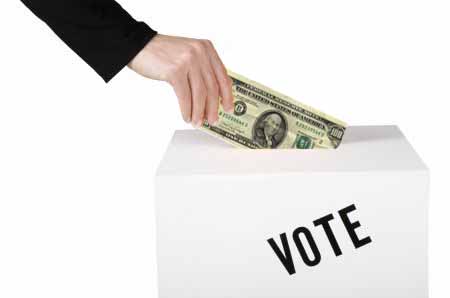 Sin Two: Super PACs and Unlimited Campaign Donations
Sin Two: Super PACs and Unlimited Campaign Donations
In 2010, the Supreme Court overturned more than a century of law that capped the amount of money that could be spent in elections. They argued that corporations were people by legal definition, and that the right to free speech was only amplified by money, so people or corporations should be able to spend as much as they want on organizations to express their views. The Citizens United and related decisions have raised the role of money in elections to unprecedented levels, also seen in the 2011 Republican presidential primaries (the Democrats did not have a presidential primary). Super PACs, supposedly operating separately from candidates’ campaign committees, buy massive amounts of negative advertising, while the candidates’ committees take a more positive tone. Some Super PACs have even up-ended races simply to knock out long-serving lawmakers, demonstrating the power of unelected billionaires and of smear advertising.
What’s faith got to do with this? Unaccountable power corrupts. As a Calvinist, I am not naïve about the power of selfishness and greed, and I don’t think the Supreme Court majority could be surprised at the money flooding into the system. It means that special interests control what can be achieved, so that the powerful get subsidies and tax breaks, and poorer states can be dominated by just a few industries and individuals. Unless our political system is fixed, it will be no surprise if the top 1% continue to get 23% of national income and already own 30% of all U.S. wealth. (The top 400 families celebrated by Forbes own more than the bottom 150 million plus Americans.)
Unless the Supreme Court changes, it may be that a new Amendment to the Constitution is needed to distinguish the free speech of citizens from the paid speech of corporations. Corporations need to be required to disclose how much of their profit and operating revenue is being spent on Super PACs, lobbyists, and political advertising. But disclosure rules have also been circumvented, and Congress is too stalemated to pass a disclosure bill for corporations and wealthy individuals.
This is why the 2012 General Assembly voted:
“…to support legislation, ballot initiatives, constitutional amendments and other means to prevent unlimited money from corporations, unions, individuals and other entities from distorting electoral campaigns and to restore legal boundaries between business corporations and human persons endowed with free speech and other constitutional rights.”
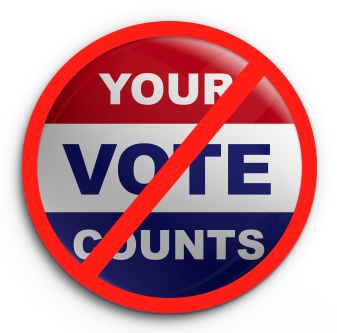 Sin Three: Voter Suppression
Sin Three: Voter Suppression
Voter suppression (i.e. under Jim Crow) used to be done by poll taxes and arbitrary tests used to keep black people from registering to vote. Now limited hours, long time requirements, new forms of identification, and deliberate disinformation are used to keep people from voting. Many legislatures restrict same-day registration, online registration, early and/or Sunday voting, and prevent those convicted of crimes from ever getting their voting rights back, disenfranchising millions who have been penalized for drug and more serious offenses. It is hard to vote in this country if you are poor or a student, and powerful interests want to keep it that way. And if you are a resident of the District of Columbia, you still have taxation without representation (Puerto Rico is somewhat similar).
What’s faith got to do with this? Voter suppression takes responsibility away from people and weakens citizenship. It hits at the root of self-government and forces people to accept poor schools, a vicious prison system, weak public transportation, high unemployment… and all of this means intensifying a divided society with double standards. The principle that people have a say in decisions that affect them emerges in the biblical text through warnings by the prophets about kings, and in the texts that value participation in councils and the voice of individual conscience. Despite the importance of community formation and solidarity, God’s voice can be heard and obeyed by each individual open to the Spirit. Though many Presbyterians may not remember how even our name reflects the importance of anti-hierarchical decision-making, the latent fear of concentrated power in our tradition should prompt us to oppose all arrogant vote-suppressors.
 Sin Four: Electoral College Gerrymandering Creates a Lengthy and Unrepresentative Campaign Process
Sin Four: Electoral College Gerrymandering Creates a Lengthy and Unrepresentative Campaign Process
I am referring not only to the ridiculous and wasteful marketing campaigns we call primaries, but the basic shaping of an electoral map that disenfranchises most citizens. First, only wealthy candidates with wealthy backers can run. Second, the early primary states of Iowa and New Hampshire have disproportionate influence. The long campaign processes take away time from governing and add enormously to social costs—without actually adding much to substantive discussion of issues. But behind this circus is an electoral college that elevates swing states and sometimes knocks out the winner of the popular vote. In such cases, clearly we do not have one person, one vote. We have an archaic system that effectively dilutes the vote of anyone living in an area with a dominant viewpoint, Republican or Democratic.
What’s faith got to do with this? Christians see society as a covenant of mutual responsibility, one that includes mutual obligation between those who govern and those who are governed. Unfair structures mean that citizens in either blue or red states are written off. Unfair primaries and Electoral College rules mean legions of people gaming the system. These inequitable structures weaken commitment to the common good, tilting the balance in politics more toward power and against public purpose. Campaigns themselves become big business, but have less and less to do with meaningful governance.
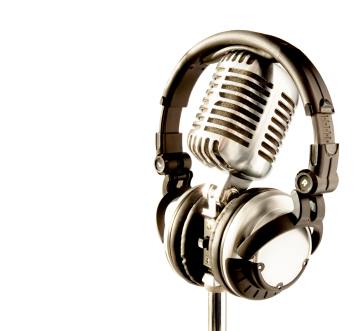 Sin Five: Incivility
Sin Five: Incivility
Incivility degrades all participants in the political process. Politics ain’t beanbag, someone said. But with the end of the Fairness Doctrine, TV and radio programs no longer have to provide opposing points of view, which means we have echo chambers, which sell advertising by entertaining consumers with insults and propaganda. The Fairness Doctrine tended to correct the lies, slander, and sometimes-bigoted language that now dominate the airwaves, striving to distort the images of candidates and those already elected.
What’s faith got to do with it? Clearly the Internet and Cable offerings make for a more complicated information environment, yet we in the church believe we can assert standards of human dignity and respect for privacy, without diminishing free speech and the valuable role of the free press in holding government accountable. Allowing candidates to sue for libel, requiring opposing points of view, and requiring public service segments from broadcasters who use parts of the public spectrum… all would help de-contaminate political programming and reduce dangerous extremism. More actual debates at all levels could also help.

Sin Six: Politicizing the Justice System
Americans believe in the rule of law. Judges thus need to be selected in ways that require qualifications and insulate their decision-making from fundraising and obligations to donors. High ethics standards need to require recusal, whereby judges disqualify themselves from particular cases where they might be interested parties. Unfortunately, in many places, judges are elected in the same money-dominated system controlled by the wealthy. In the case of the Supreme Court, one justice in particular has had to re-file his disclosure forms to acknowledge potential conflicts of interest and political involvements, and few have ever recused themselves from cases—some of which are highly political. Citizens United is a case in point, but so are many cases brought between regulated industries and the government seeking to enforce protections of the common good.
What’s faith got to do with this? Justice is a virtue that reflects the basic integrity of the society. Judicial review is part of the checks and balances that are designed to protect the fairness of our system, and those checks and balances reflect an understanding of the dangers of unchecked power. Ultimately, in our view, our justice is to reflect God’s justice, preventing self-interest and defending the rights of all, equally. The scriptures are full of warnings to those who pervert justice, and contribute to the corruption of societies. While racial distortions appear in sentencing and the application of the death penalty, it is also clear that money enormously distorts the whole criminal justice system and often destroys the possibilities for rehabilitating human beings who are children of God.
The 2006 Presbyterian resolution, “Lift Every Voice,” mentions some practical changes in the Supreme Court make up, such as 18 year terms, that would prompt a bit more turnover and give incentive for older and more proven nominees. The recent book by Sanford Levinson, Framed: America’s Fifty-One Constitutions and the Crisis of Governance (Oxford, 2012), reviewed by retired Supreme Court Justice John Paul Stevens (New York Review, Oct 11, 2012), looks beyond many structural fixes to imagine a new Constitutional convention. The basic point here is that the judicial branch is not preventing corruption but abetting it in many cases, and may have let itself be captured by loss of its moral independence.
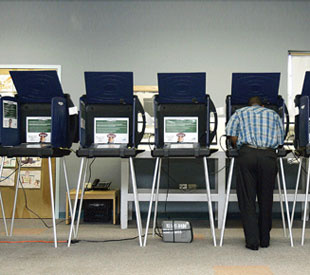 Sin Seven: Incompetence of Election Mechanics
Sin Seven: Incompetence of Election Mechanics
The seventh sin against democracy is the sheer incompetence of our unprofessional and underfunded state, county, and municipal election commissions. Cheap and malfunctioning voting machines, partisans running the commissions, lack of national quality standards—all of these weaken the democracy of one person, one vote. Hanging chads are only part of it; thousands of ballots are routinely thrown out for technicalities that depend on the whims of local officials. Recounts regularly reveal abuses. It is time to professionalize the basics and to guarantee a right to vote for all U.S. citizens.
What’s faith got to do with it? Weakening our government does not bring greater freedom; it means we are ruled more by unelected billionaires and their lobbyists and puppets. Some of us remember people who fought hard and suffered to get the vote. We see countries in the world that are not democracies. But we also see countries that have effective public decision-making and trustworthy elections, at much lower cost. In this context, Christian faith does not directly seek to heal voting machines or increase budgets for county boards of election. But the valuing of public service, and the sense that all branches of government in some sense do justice, means looking for self-interest and corner-cutting at every level. Gross disrespect of voters undermines the legitimacy of elections and contributes to a culture of cynicism and distrust—a climate which faith, as well as honesty, must oppose.
 Seven Sins Against Democracy
Seven Sins Against Democracy
The bottom-line for our faith is that societies are judged by how the people on the bottom are treated. Cleaning up politics will not solve all our problems, but better government should at least be able to address the big problems and not be blocked by special interests as it is today. Speaking as a Christian, I look to the prophet Jesus who challenged rulers and changed the rules by saying, “I am among you as one who serves.” He lived that out. And he warned us not to be like the nations, “where the powerful lord it over others.”
Please join with us as we witness and advocate for a country where politics is a high calling, where floods of money do not drown democracy, and where corruption is pushed back by good laws, fairly administered. And on the naïve and destructive Citizens United decision especially, we urge support for constitutional amendments that protect free speech for people, and restore Congress’ authority to control the power of unlimited money.
Read more extensive treatments of these threats to democracy in the complete series, “Sins Against Democracy”
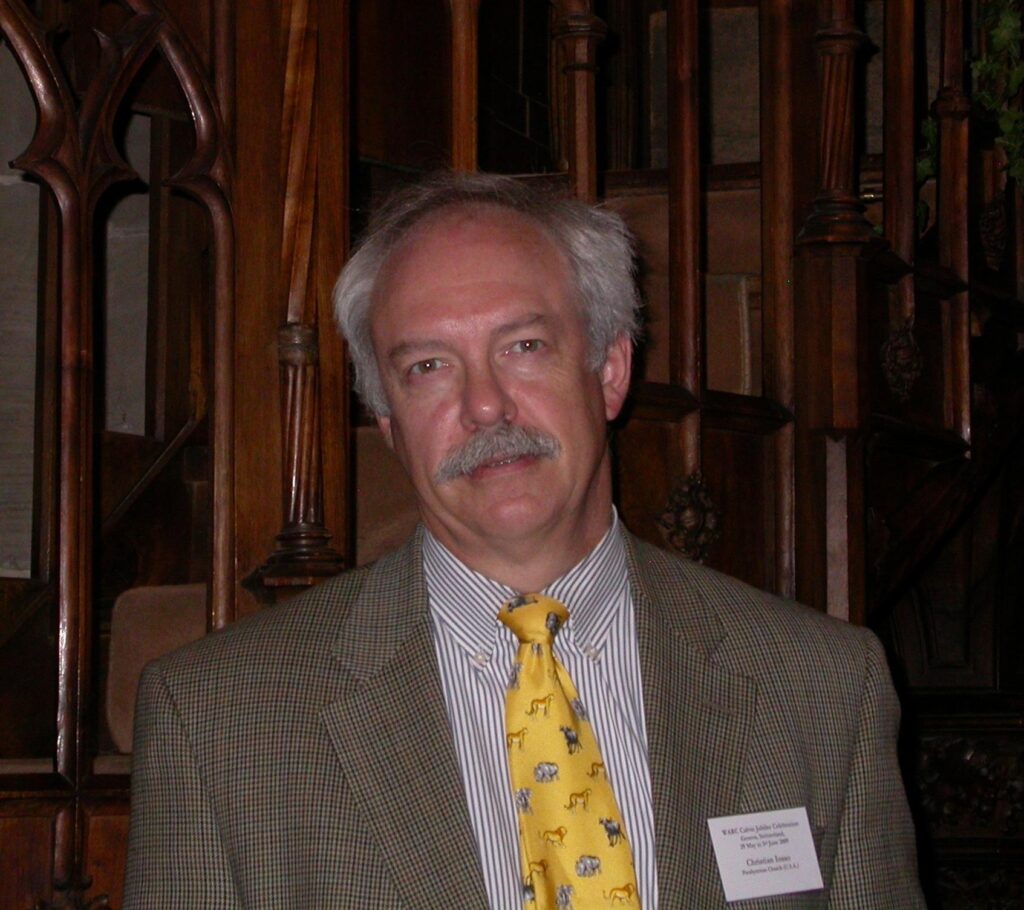 The Rev. Dr. Christian Iosso is the Coordinator of the Advisory Committee on Social Witness Policy of the Presbyterian Church (U.S.A.) and the General Editor of Unbound. His Master of Divinity comes from Princeton Theological Seminary and his Ph.D., from Union Theological Seminary in New York City. He served as pastor of the Scarborough Presbyterian Church in Briarcliff, NY, from 1992–2005.
***Banner Photo “Democracy on Fire” Explanation: The desecration of American democracy by the seven sins named in this article bears analogy to the burning of the American flag.
The Rev. Dr. Christian Iosso is the Coordinator of the Advisory Committee on Social Witness Policy of the Presbyterian Church (U.S.A.) and the General Editor of Unbound. His Master of Divinity comes from Princeton Theological Seminary and his Ph.D., from Union Theological Seminary in New York City. He served as pastor of the Scarborough Presbyterian Church in Briarcliff, NY, from 1992–2005.
***Banner Photo “Democracy on Fire” Explanation: The desecration of American democracy by the seven sins named in this article bears analogy to the burning of the American flag.
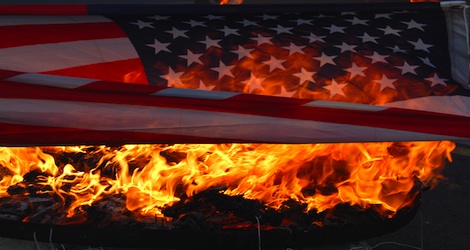









Pingback: » Seven Sins Against Democracy – And What's Faith Got to Do With It …
A wonderful article Dr. Iosso! Our fair elections also depend on an informed electorate. Our broadcast news channels only provide cursory coverage of the issues and many, many homes lack cable, satellite or internet access. The vigorous debates that occur every day, all day on these latter forums is denied to the majority of our voters. This means that many people vote without any idea of the ramifications of the choice they made. Sadly, many vote counter to their own wellbeing and the wellbeing of the country because of misinformation. We have come to a point in our history when Benjamin Franklin’s answer to being asked what kind of a government he had given the country rings true once again. He said “A democracy, if you can KEEP it!”